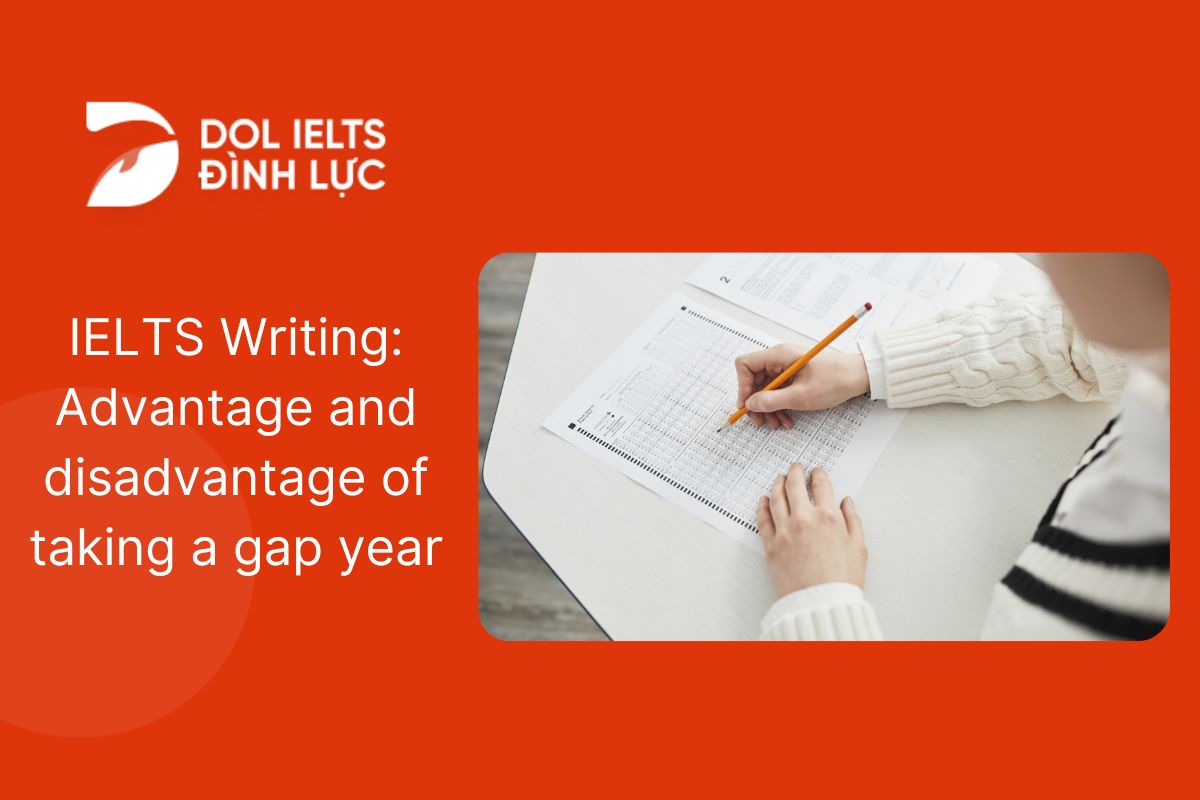IELTS Writing: Advantage and disadvantage of taking a gap year
Gap year IELTS là một chủ đề bất hủ của kỳ thi này có lẽ một phần cũng vì phần lớn các chiến sĩ IELTS cũng đang trong độ tuổi mà quyết định gap hay không gap cần được cân nhắc kỹ lưỡng. Cùng DOL xem qua bài sample band 8.0 của nhà DOL để tích lũy kha khá từ vựng và cấu trúc hay ho của chủ đề này bạn nhé.
DOL IELTS Đình Lực
Oct 12, 2022
2 mins read

Table of content
1. Đề
2. Paraphrase Keywords
3. Bài mẫu band 8
4. Từ vựng
Câu hỏi thường gặp
1. Đề
In some countries, young people are encouraged to work or travel for a year between finishing high school and starting university studies. Discuss the advantages and disadvantages for young people who decide to do this.
Trong bài viết này, DOL sử dụng đề trên làm mẫu chính. Sau khi đọc đề, việc đầu tiên DOL làm sẽ là xác định cấu trúc cần viết, phân tích đề, và lên ý tưởng.
1.1 Xác định cấu trúc
DOL sẽ trình bày quan điểm qua 1 đoạn mở bài (introduction), 2 đoạn thân bài (body paragraph), và 1 đoạn kết bài (conclusion)
Mở bài
Sau khi paraphrase lại đề bài, DOL sẽ đưa ra một Thesis Statement (luận điểm) để cho giám khảo biết là có advantages and disadvantages gì cho việc gap 1 năm để đi học và du lịch.
Thân bài
Body 1: Đầu tiên, DOL sẽ chỉ ra các lý do vì sao hành động này lại bất lợi cho các bạn trẻ.
Body 2: Tiếp đến, DOL sẽ chỉ ra việc này có lợi như thế nào cho các bạn ấy.
Kết bài
Cuối cùng, DOL sẽ nhấn mạnh lại câu trả lời của mình qua việc paraphrase lại advantages and disadvantages.
1.2 Lên ý tưởng
Body 1: What are the disadvantages for students to take a gap year for traveling or working before starting their university life?
Ở đây có thể specify bất lợi từ việc du lịch và làm việc như sau:
Damaging students’ mental health: Traveling -> Far away from family and friends -> Lack of finance to see them more frequently ->
Detering students from pursuing further education: Working students think that money is more critical than studying -> reluctant to resume their education -> jeopardized future.
Body 2: What are the advantages for students to take a gap year for traveling or working before starting their university life?
Ở đây có thể specify lợi ích từ việc du lịch và làm việc như sau:
Improve students’ knowledge: Traveling students -> broaden their horizon -> learn about different ways of life -> comprehending the world.
Financial management: Working makes them value their money -> learn to plan their finance appropriately.
2. Paraphrase Keywords
DOL paraphrase các keywords chính của đề bài gap year IELTS này như sau:.
In some countries, young people are encouraged to work or travel for a year between finishing high school and starting university studies.
=> In certain areas around the world, high school graduates are encouraged to take a gap year before attending college.
=> In many parts of the world, adolescents are advised to pause their studies for a year to join the workforce or to embarking on trips around the world.
=> Between graduating from high school and beginning their university studies, young adults in some parts of the world are sometimes urged to work or travel for a year.
🔎 Tham khảo thêm bài viết:
📌 Cùng với đó là các dạng bài có liên quan với nhau:
3. Bài mẫu band 8
In some countries, young people are encouraged to work or travel for a year between finishing high school and starting university studies. Discuss the advantages and disadvantages for young people who decide to do this.
In certain areas around the world, high school graduates are encouraged to take a gap year before attending college. Although taking a year off from education to travel or work might be damaging to students’ mental health as well as their postgraduate education, a gap year can also improve students' general knowledge and financial management.
On the one hand, the negatives of taking a gap year include a poor mental state and an unwillingness to pursue further education. First of all, traveling may be detrimental to their emotional and mental well-being. The reason is when students travel, they will be far away from their loving family and friends, thus homesickness is unavoidable, and travel costs are frequently too expensive for young people to see their families regularly. Furthermore, individuals who are employed may be reluctant to resume university education. This shifting mindset is predicated on the assumption that generating money is more exciting and that the taste of independent lifestyles is addictive. For students who abandon higher studies, their educational future would be jeopardized, as having a diploma is now considered necessary to be more competitive in the corporate world.
On the other hand, traveling or working before starting university provides significant benefits to one's world knowledge and personal finance. Young students will be able to broaden their international perspective as a result of overseas trips. Japanese students, for instance, frequently journey to Western nations such as the United States or Canada to learn about diverse ways of life, which aids them in comprehending the world. Another advantage is that these adolescents will be able to grasp the value of their money and appreciate the significance of the hardships required to acquire it. As a result, they will be capable of managing money more responsibly and learning how to plan their lives ahead of time.
In conclusion, taking a year off from school to travel or work could be disruptive to a student's further education and emotional wellness, however, a gap year can also allow them to become more knowledgeable and adept at managing their finance.
(346 words)
4. Từ vựng
Từ Vựng | Ý Nghĩa | Ví Dụ |
negatives | điều tồi tệ | Try not to focus on the negative. |
pursue further education | học cao | Pursuing further education does wonder for your professional career at top companies. |
be reluctant to | ngần ngại làm gì | I’m reluctant to get off my bed on Saturday mornings. |
shifting mindset | tư duy thay đổi | This shifting mindset of the employees can be beneficial to the company in the long-term. |
be predicated on the assumption that | dựa vào các giả định rằng | This cruel behavior is predicated on the supertitious assumption that tigers’ fangs can defend wearer from evil forces. |
the taste of independent lifestyles | hương vị của cuộc sống độc lập | To enjoy the taste of independent lifestyles, you must be brave enough to get out of your own comfort zone. |
higher studies | bậc học cao | Higher studies usually cost learners a fortune. |
to jeopardize | làm hư hại | He would never do anything to jeopardize his career. |
to have diploma | có bằng cấp | Having a diploma in data analytics is considered competitive. |
to broaden one’s perspectives | mở rộng góc nhìn của ai | In order to consider yourself having a growth mindset, you need to accept your mistakes and start to broaden your perspectives. |
adept at something | giỏi 1 việc gì đó được xem như là khó | I am adept at convincing business managers to try our information management system. |
📘 Ngoài chủ đề này ra, DOL còn cung cấp thêm vốn từ vựng thông qua bài viết
Câu hỏi thường gặp
Gap year trong IELTS là gì?
Gap year được hiểu như khoảng thời gian bất kỳ nào đó bạn đã bỏ trống trong quá trình học tập hoặc làm việc của mình. Chẳng hạn như bạn tham gia quá trình học đại học từ năm 2017 - 2023, nhưng có 1 năm 2020 bạn không học tập mà thay vào đó là thực hiện những kế hoạch khác như du lịch. Và mặc dù gọi là “Gap year" nhưng khoảng thời gian này có thể kéo dài hoặc ngắn hơn 12 tháng.
Gợi ý bài viết IELTS: Cần bao nhiêu chi phí cho 1 năm “Gap year"?
Tùy vào nhu cầu chi tiêu và thực hiện các kế hoạch trong năm đó mà người ta sẽ cần đến những khoản tiền khác nhau. Nhưng mức chi phí cho Gap year thường nằm trong khoảng 5.000 - 7.000 đô la/ người/ năm.
Gợi ý bài viết IELTS: Tỉ lệ sinh viên có khoảng thời gian Gap year là bao nhiêu?
Theo nghiên cứu của Foundry10, có khoảng 20% sinh viên đã từng có khoảng thời gian Gap year trong giai đoạn 2020 - 2021. Trong khi đó, vào năm 2018, tỉ lệ này là 3%.
Gợi ý bài viết IELTS: Nhược điểm của Gap year là gì?
Transition Back to School Could Be More Difficult (Việc trở lại trường học có thể trở nên khó khăn hơn)
Feel Behind Your Peers (Khiến bạn cảm thấy bị tụt lại phía sau so với bạn bè cùng trang lứa)
Expensive (Chi phí tốn kém)
CRequires Planning (Đòi hỏi bạn phải lên lại kế hoạch cho lộ trình học tập)
DOL hy vọng là bài viết trên đã giúp bạn biết nhiều hơn về đề gap year IELTS để có thể áp dụng tự học hiệu quả.
Nếu có bất kỳ thắc mắc gì về IELTS Speaking hay các kỹ năng, đừng ngần ngại mà liên hệ DOL qua các kênh sau bạn nhé: website, Facebook.
Chúc bạn thành công.
Table of content
1. Đề
2. Paraphrase Keywords
3. Bài mẫu band 8
4. Từ vựng
Câu hỏi thường gặp
